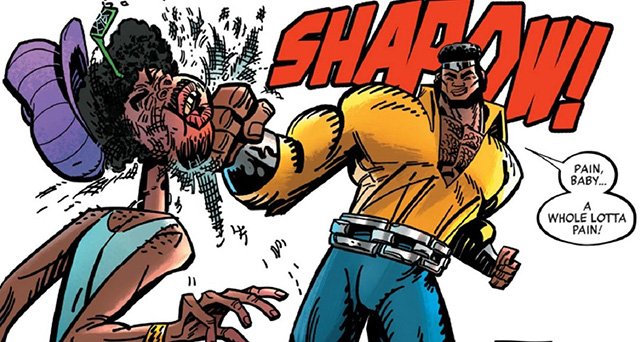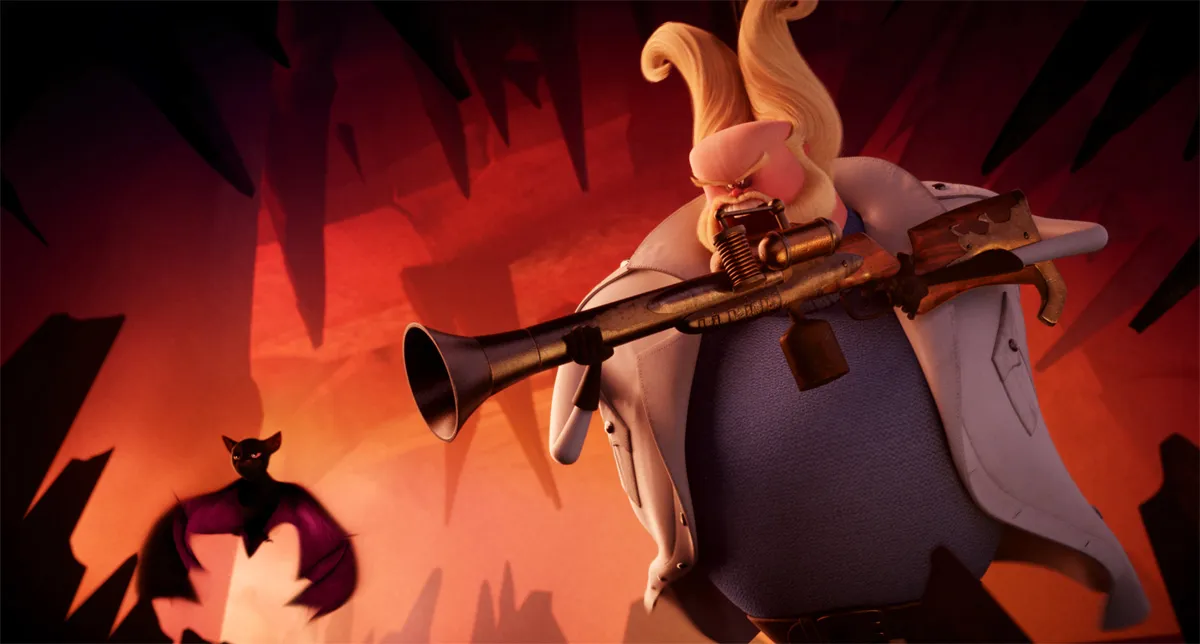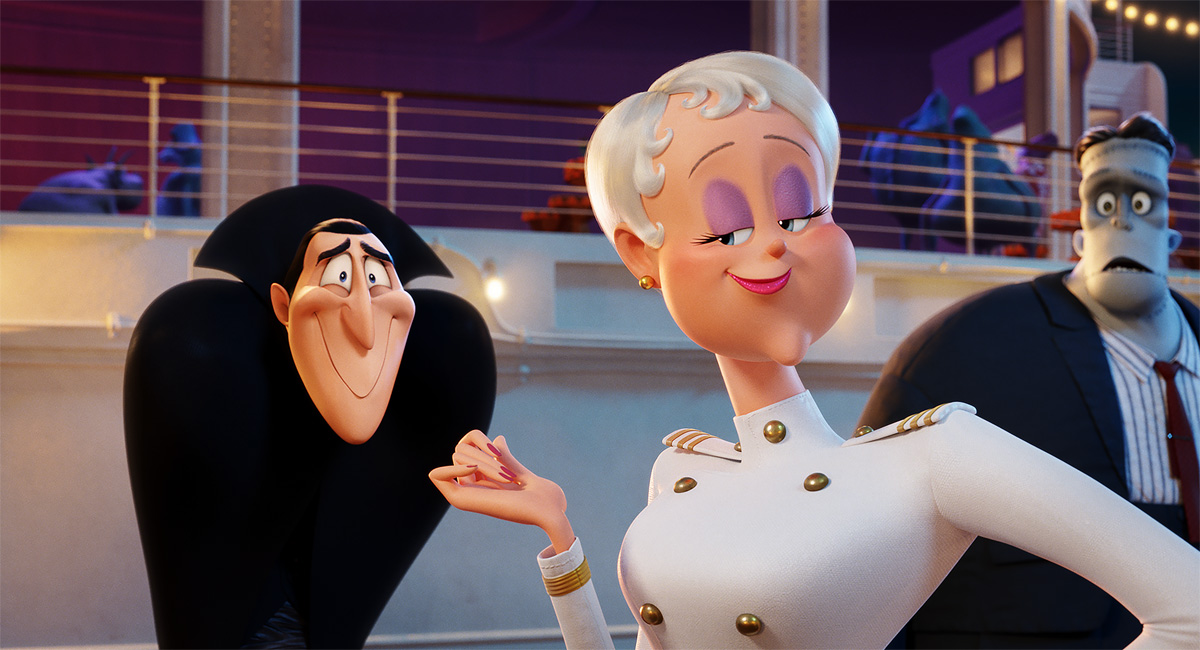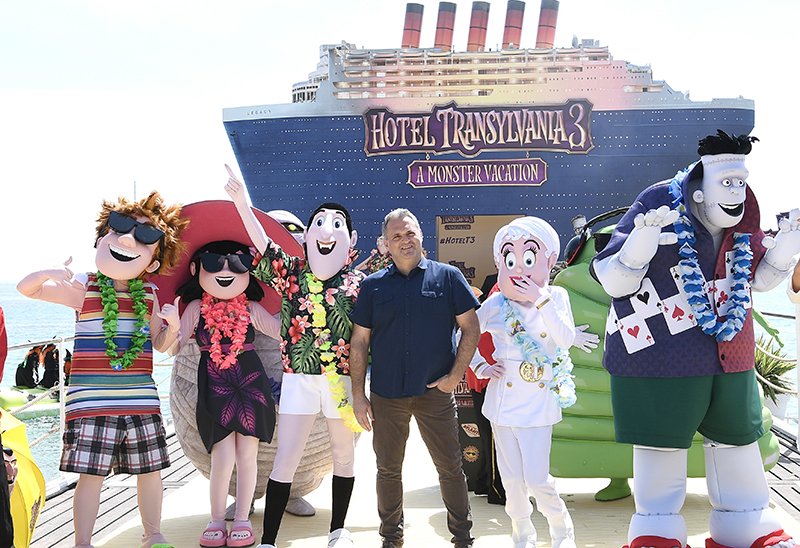Sony Pictures Animation’s Hotel Transylvania 3: Summer Vacation grabbed the #1 spot this weekend at the worldwide box office, debuting to an estimated $44.1 million for the three-day weekend domestically. Before it opened, ComingSoon.net had the chance to talk to the trilogy’s director, Genndy Tartakovsky (Samurai Jack, Star Wars: Clone Wars) about the influence of Mad Magazine’s Harvey Kurtzman and other comic book artists on his style.
Featuring the voices of Adam Sandler, Andy Samberg, Selena Gomez, Kevin James, David Spade, Steve Buscemi, Keegan-Michael Key, Molly Shannon, Fran Drescher, Kathryn Hahn, Jim Gaffigan, and Mel Brooks, the sequel is directed by Genndy Tartakovsky.
RELATED: Genndy Tartakovsky Talks Hotel Transylvania 3, Iron Man 2 & More!
ComingSoon.net: How’s it feel to be finished with the film?
Genndy Tartakovsky: It feels good. There’s always a panic that sets in after you deliver. They start having screenings for normal audiences, and you’re like, “Wait, what did I do? Is everything working? Is it okay?” With everything it concerns, you start to question it a little bit, and then once you hear good things the pressure goes away a little bit. But I’m very proud of this movie and so it feels good.
CS: Last time you told me that Harvey Kurtzman was a big influence on you artistically and, of course, he actually wrote the script for the “Mad Monster Party” years ago, so I was just curious in what specific ways you think Kurtzman influenced this film particular?
Tartakovsky: It was definitely his drawing style and some of the irreverent comedy. His drawings are so fluid, and so saturated, and very cartoony in a different sense. And you know, I have all these kind of Warner Brothers, Tex Avery influence. There’s one person that draws like Kurtzman. And so we try to apply that idea to everything that we do, like when Frank talks, or expands, or is drawn a certain way. And his body posture standing is gonna be different than the Mummy’s body posture and Dracula’s. So that’s why there’s a specific quality applied to each of the characters. That was inspired by Kurtzman.
CS: Yeah. There was always this kind of elasticity and kind of a madness to his art. It felt very manic, almost like it was gonna kinda just burst off the page, and, yeah, I see a lot of that, kind of the pacing of the way you animate the characters.
Tartakovsky: For sure, for sure.
CS: Yeah. And also I’m a big fan of the occult. I’m not a practitioner of the occult, but I’m a big fan of the occult. Especially like the stuff from the 70’s era, when all the sudden everybody was interested in psychic powers and Yetis and cow mutilations, and all this weird stuff. What was the thing that first sort of made you excited about monsters and the occult, and all that sort of stuff?
Tartakovsky: The funny thing is, I’m the exact opposite of that. When I was a kid I was very scared. One night I was sick and I watched the old black and white Invasion of the Body Snatchers. And it freaked me out. I really realized that I don’t like being scared. But at the same time, I like the mythology aspect, the romantic aspects, of Dracula’s story and The Wolfman. You know, they’re all very tragic tales, right? And so I like the mythology and the storytelling end of it and so I’m like, “Well how am I gonna get my fit of this monster lore?” And it wasn’t until Abbot and Costello Meet Frankenstein or Meet Dracula or Meet the Mummy that came along that I realized, “I can get into it through humor.” And especially after Young Frankenstein, those things really connected with me and so all my monster love… I mean later I read the books and developed a whole appreciation of that, but, early on, my love of monsters came from comedy. And I never sought out Hotel Transylvania, it kind of fell on me, and so it was kind of ironic that the thing that made me comfortable with monsters is the thing that I’m gonna be delivering at the movies.

CS: Yeah, comedy is kind of a fun little back door into loving monsters. I recently did an article for our site about Directors Who Are Hardcore Comic Book Fans. Right after I published it, my editor was like, “Oh, you know Genndy Tartakovsky wrote a Luke Cage comic book?” and I was like, “Aw man! I should have included Genndy in there!” But I was wondering if you could just talk to me a little bit about what comic books mean to you, how they’ve influenced you, and what you love about them?
Tartakovsky: I grew up in the 70’s, early 80’s as a kid, and when we first immigrated to this country I went to a 7-Eleven and for the first time in my life I saw… back in the day they had this little spinning comic book rack, and there were comic books and I was basically drawn to them. The first one that I bought was just a “Super Friends” because I was watching it on TV. And I got bit. I fell in love and then suddenly I was with the golden age of comic books when we had the coming of the Dark Knight, of course. John Byrne, Walt Simonson, also Frank Miller, who did Daredevil. There were so many amazing comic books. Like I was around for the original Frank Miller/Chris Claremont Wolverine miniseries. So not only did I copy it, or try to copy it, but also I loved the stories, loved the way the stories were told, so much so that I would actually go to the little mini Cons in Chicago, which is where I was growing. And luckily for me John Byrne was a local just outside of Chicago, so he would be there. And I seriously remember I was age 13 or 14, standing – never having the courage to come up and say something – but just standing next to him, watching him draw for about three hours. I couldn’t believe that somebody could just sit there and sketch so easily and then he could get, like, Captain America or something. But I really fell in love with drawing because of comics, certain types storytelling. And at the same time, of course, I was also loving Warner Bros. and Tex Avery and Popeye and all this animation. And those two worlds kind of melted together for me.
CS: Right. Yeah. Like if you combine Tex Avery with Frank Miller’s Wolverine then you get “Samurai Jack,” basically.
Tartakovsky: (laughs) Yeah.
CS: I recently talked to a big director who’s a comic book fan and we started talking a little bit about the directors who get hired to make a comic book movie who’ve never read a comic book in their life. I think he referred to them as “carpetbaggers” or something. The ones that just get the bible from the studio and they familiarize themselves with the Cliff’s Notes version. Obviously you don’t have to love comic books to make a good comic book movie, but what do you think is the advantage of a filmmaker being familiar with that world?
Tartakovsky: Well, it’s funny. Being a hardcore old-school comic book lover, it took me a while to accept the need for comic book movies. They changed so much. To your point, I don’t know, especially early on before they established the newness of everything, if I got the opportunity I could step in and change it as much as people have changed it. Because I have such a love and fondness and emotional connection to them. Even changing the costumes, like, “No, that’s wrong! Captain America is wearing spandex!” And in my mind it’s still that simplistic comic book way. So I wonder -without going through this I’ll never know- but I wonder if maybe it is better for somebody who doesn’t have that emotional connection to it, for them to do it rather than somebody who has so much baggage about the comic book heroes that I wouldn’t wanna change it. It’s interesting.
Hotel Transylvania 3
-
Hotel Transylvania 3: Summer Vacation

-
Hotel Transylvania 3: Summer Vacation

-
Hotel Transylvania 3: Summer Vacation

-
Hotel Transylvania 3: Summer Vacation

-
Hotel Transylvania 3: Summer Vacation

-
Hotel Transylvania 3: Summer Vacation

-
Hotel Transylvania 3: Summer Vacation











